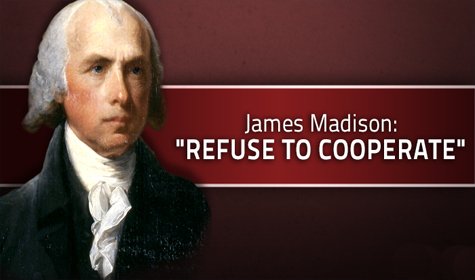The Supreme Court has long held that states do not have to be active participants in the enforcement or effectuation of federal acts or regulatory programs.
The basis for what is now known as the legal doctrine of “anti-commandeering” was the advice of James Madison, written in Federalist #46. There, he advised four primary tactics for individuals and states to effectively push back against federal overreach, including a “refusal to cooperate with officers of the Union.”
The following are the four landmark cases where the Court has upheld this doctrine.
In Prigg v. Pennsylvania (1842), Justice Joseph Story held that the federal government could not force states to implement or carry out the Fugitive Slave Act of 1793. He said that it was a federal law, and the federal government ultimately had to enforce it:
The fundamental principle applicable to all cases of this sort, would seem to be, that where the end is required, the means are given; and where the duty is enjoined, the ability to perform it is contemplated to exist on the part of the functionaries to whom it is entrusted. The clause is found in the national Constitution, and not in that of any state. It does not point out any state functionaries, or any state action to carry its provisions into effect. The states cannot, therefore, be compelled to enforce them; and it might well be deemed an unconstitutional exercise of the power of interpretation, to insist that the states are bound to provide means to carry into effect the duties of the national government, nowhere delegated or instrusted to them by the Constitution.
In New York v. United States (1992) the Court held that the regulations in the Low-Level Radioactive Waste Policy Amendment Act of 1985 were coercive and violated the sovereignty of New York, holding that “because the Act’s take title provision offers the States a ‘choice’ between the two unconstitutionally coercive alternatives–either accepting ownership of waste or regulating according to Congress’ instructions–the provision lies outside Congress’ enumerated powers and is inconsistent with the Tenth Amendment.”
Sandra Day O’Connor wrote for the majority in the 6-3 decision:
As an initial matter, Congress may not simply “commandee[r] the legislative processes of the States by directly compelling them to enact and enforce a federal regulatory program.”
She later expounded on this point.
While Congress has substantial powers to govern the Nation directly, including in areas of intimate concern to the States, the Constitution has never been understood to confer upon Congress the ability to require the States to govern according to Congress’ instructions.
Printz v. United States (1997) serves as the lynchpin for the anti-commandeering doctrine. At issue was a provision in the Brady Gun Bill that required county law enforcement officers to administer part of the background check program. Sheriffs Jay Printz and Richard Mack sued, arguing these provisions unconstitutionally forced them to administer a federal program. Justice Antonin Scalia agreed, writing in the majority opinion “it is apparent that the Brady Act purports to direct state law enforcement officers to participate, albeit only temporarily, in the administration of a federally enacted regulatory scheme.”
Citing the New York case, the court majority declared this provision of the Brady Gun Bill unconstitutional, expanding the reach of the anti-commandeering doctrine.
We held in New York that Congress cannot compel the States to enact or enforce a federal regulatory program. Today we hold that Congress cannot circumvent that prohibition by conscripting the States’ officers directly. The Federal Government may neither issue directives requiring the States to address particular problems, nor command the States’ officers, or those of their political subdivisions, to administer or enforce a federal regulatory program. It matters not whether policymaking is involved, and no case-by-case weighing of the burdens or benefits is necessary; such commands are fundamentally incompatible with our constitutional system of dual sovereignty.
In Independent Business v. Sebelius (2012), the Court held that the federal government can not compel states to expand Medicaid by threatening to withhold funding for Medicaid programs already in place. Justice Roberts argued that allowing Congress to essentially punish states that refused to go along violates constitutional separation of powers.
The legitimacy of Congress’s exercise of the spending power “thus rests on whether the State voluntarily and knowingly accepts the terms of the ‘contract.’ ” Pennhurst, supra, at 17. Respecting this limitation is critical to ensuring that Spending Clause legislation does not undermine the status of the States as independent sovereigns in our federal system. That system “rests on what might at first seem a counterintuitive insight, that ‘freedom is enhanced by the creation of two governments, not one.’ ” Bond, 564 U. S., at ___ (slip op., at 8) (quoting Alden v. Maine, 527 U. S. 706, 758 (1999) ). For this reason, “the Constitution has never been understood to confer upon Congress the ability to require the States to govern according to Congress’ instructions.” New York, supra, at 162. Otherwise the two-government system established by the Framers would give way to a system that vests power in one central government, and individual liberty would suffer.
Taken together, these four cases firmly establish a legal doctrine holding that the federal government has no authority to force states to participate in implementing or enforcing its acts.
Madison’s advice in Federalist #46, supported by the anti-commandeering doctrine, provides a powerful tool that states can use against federal acts and regulatory programs.

